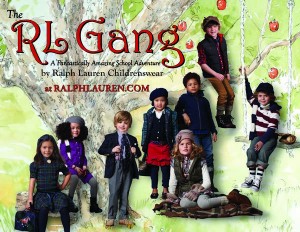Ralph Lauren Pretends His Catalog is a Book For Kids
Posted on May 1, 2011 at 9:07 pm
Renée Loth writes in the Boston Globe this weekend about Ralph Lauren’s new “book” for children — really a thinly disguised catalog. They’re calling it “The first ever shoppable children’s storybook.’’
“The RL Gang: A Magically Magnificent School Adventure’’ is a 32-page volume, aimed at preschool-age children. Its slim plot involves a group of eight impossibly cute classmates, all dressed in Polo Ralph Lauren finery, with names like Willow, Oliver, Hudson, and River. The junior fashion icons use magical paintbrushes to draw themselves a garden party that comes alive, complete with ice cream and kittens.
Woozy yet? Reading along in the online video version — narrated by Uma Thurman — parents and kids can take a break to “look inside Oliver’s closet,’’ for example, and buy the twee outfits. “The RL Gang’’ is touted unblushingly as “an innovative way for parents and children to explore style, literature, and digital technology together.’”
It’s bad enough when product placement makes movies and television shows into infomercials and cross-promotions turn all kinds of products and almost-always unhealthy food into promotions for movies and television shows. But this is essentially a catalog designed to sell very expensive clothes to children, who are not old enough to understand the fast-disappearing line between writing and pictures that are intended to tell a story based on imagination, experience, and heart and writing and pictures designed to make you think you want things you would otherwise never have thought about.
To complain: CustomerAssistance@RalphLauren.com



